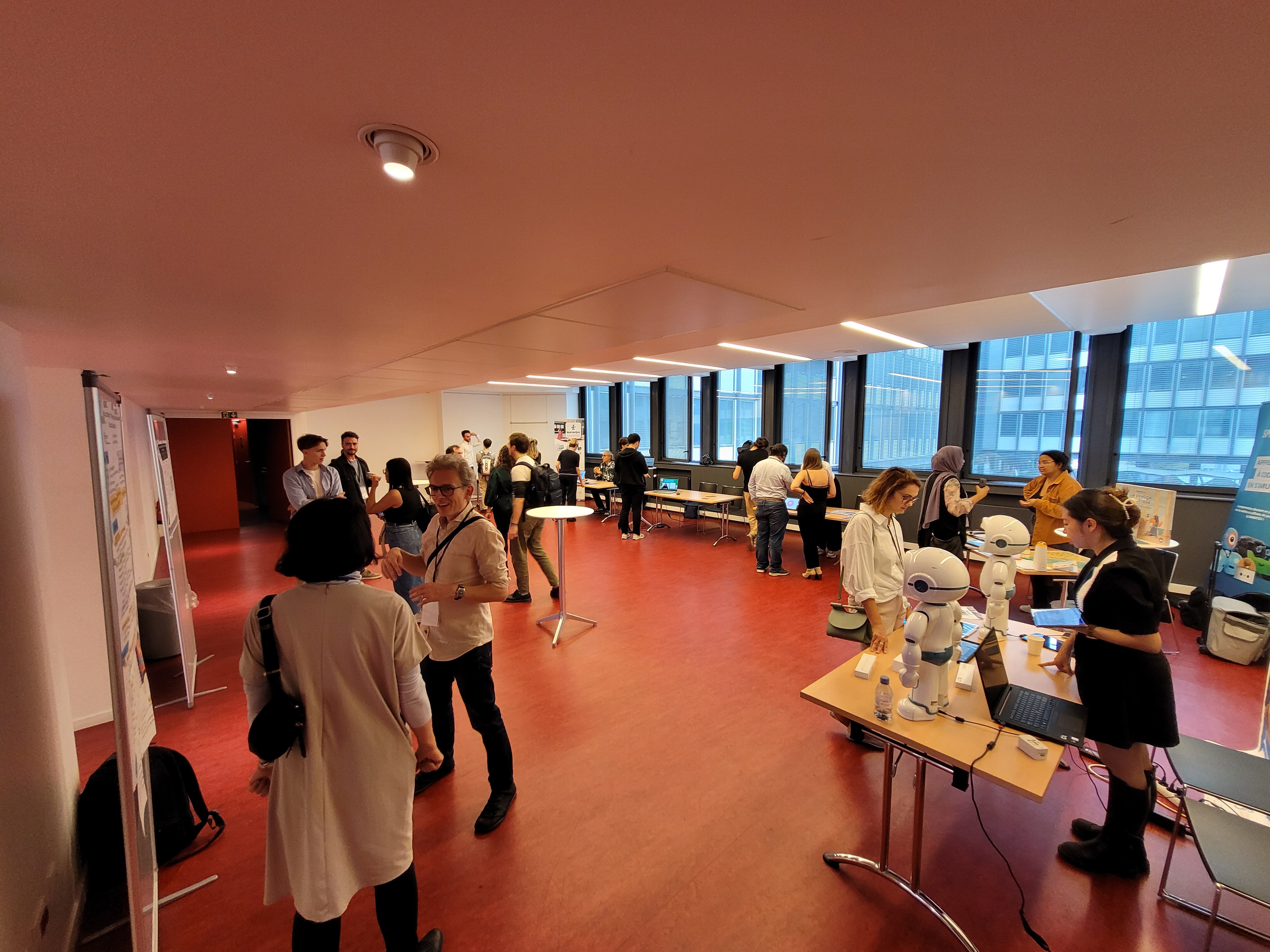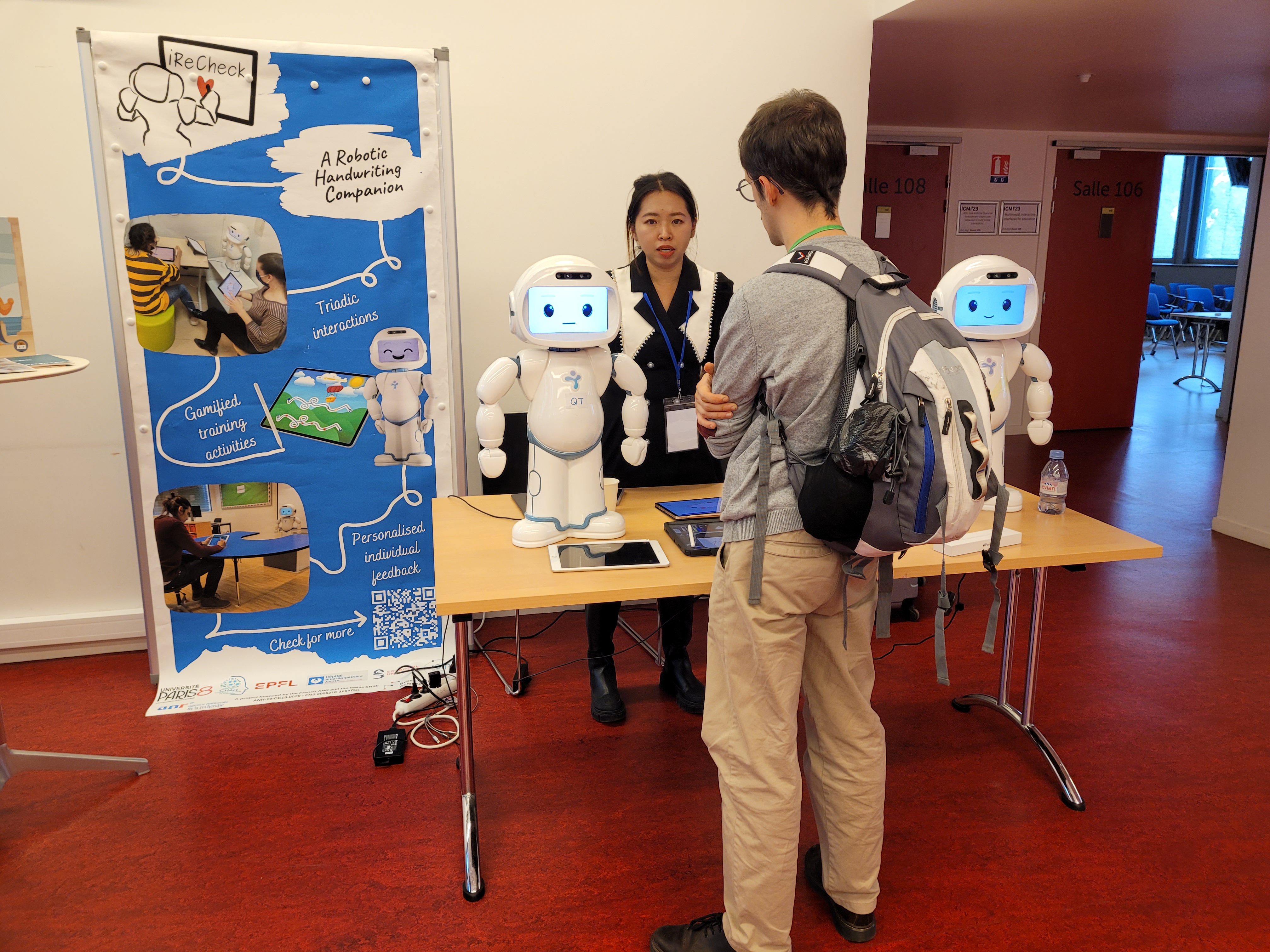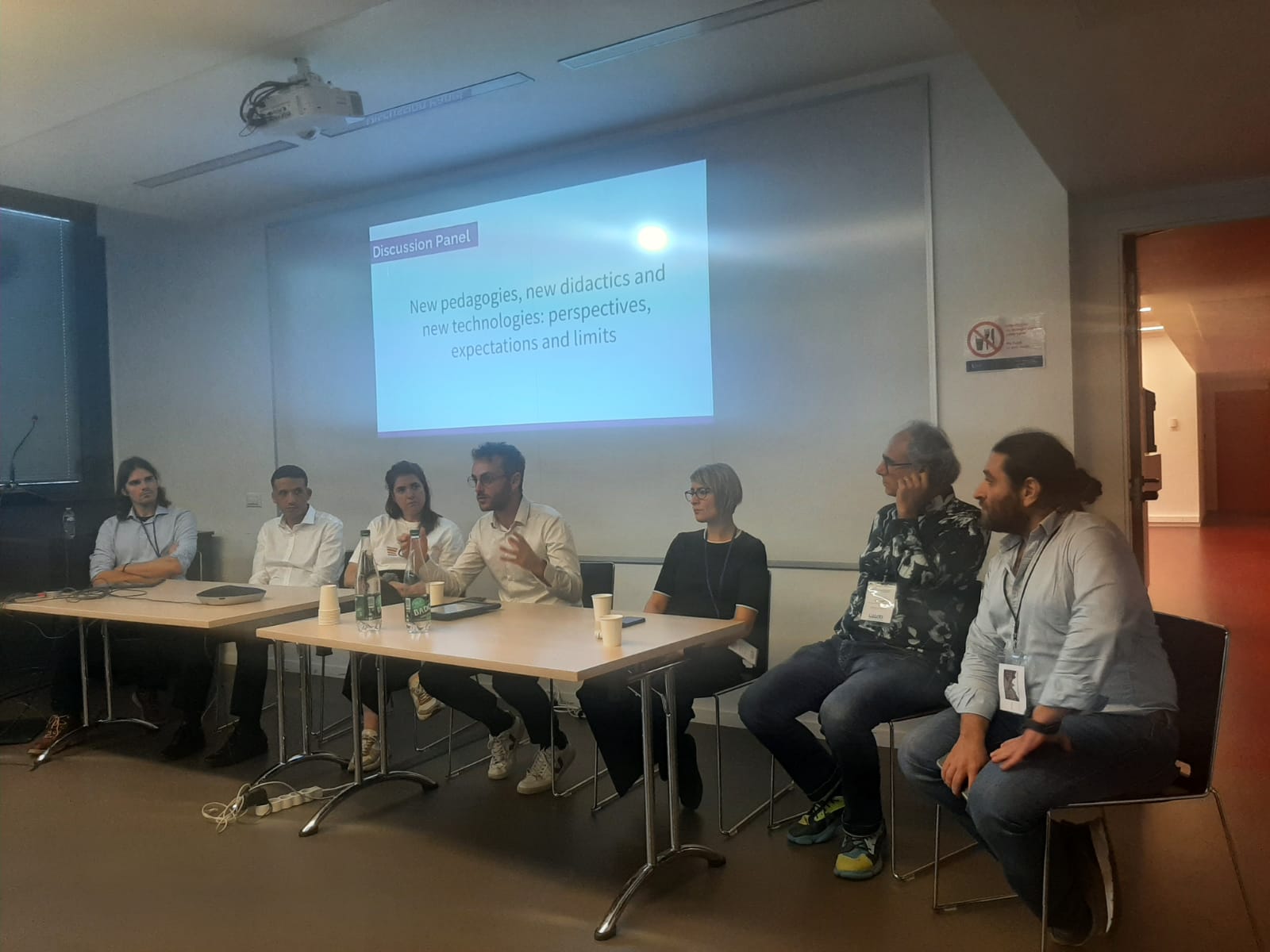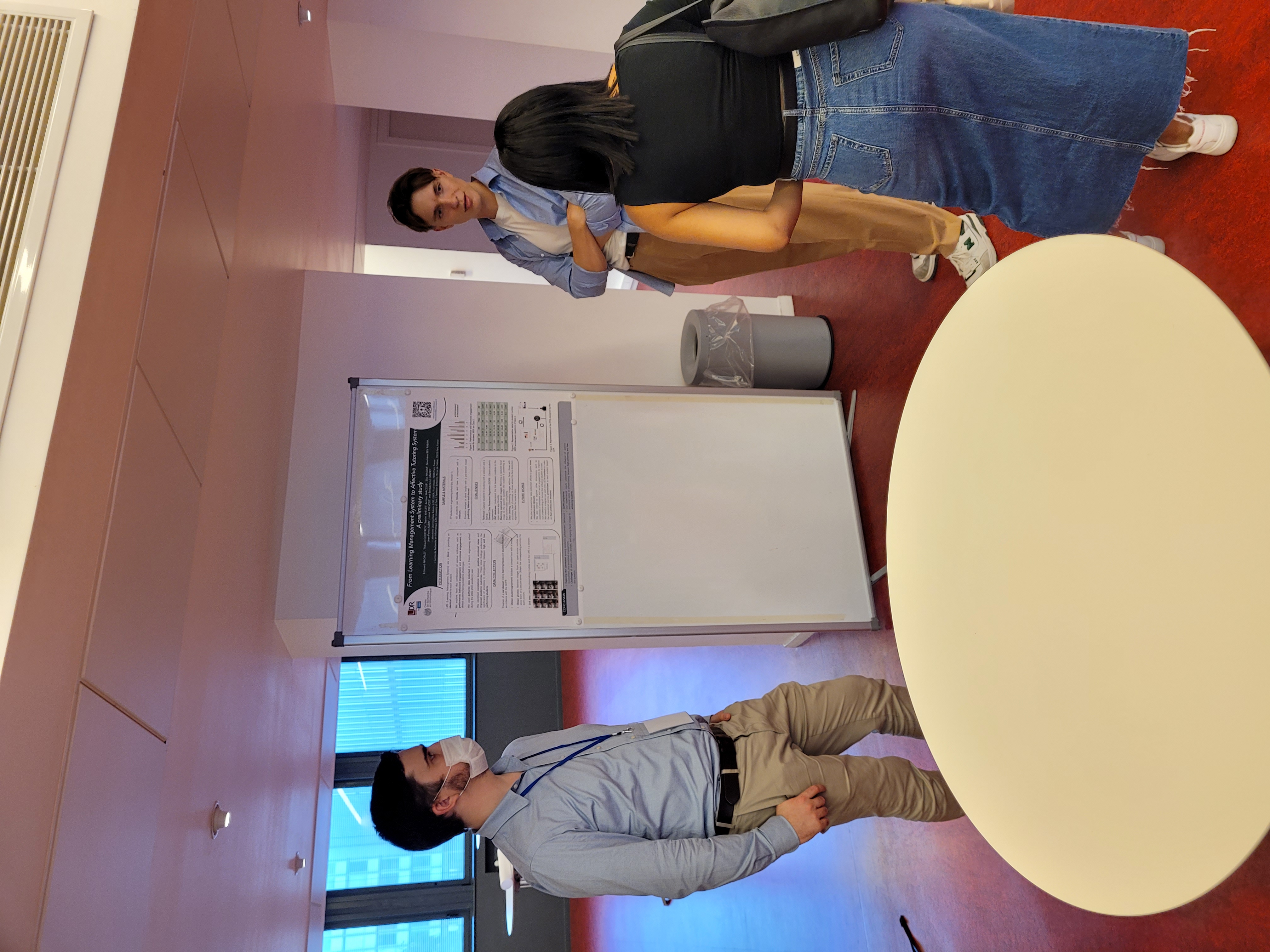ICMI 2023
Workshop on
Multimodal, Interactive Interfaces for Education
Welcome to the site web of the ICMI 2023 International Workshop on Multimodal, Interactive Interfaces for Education, part of the 25th ACM International Conference on Multimodal Interaction.



Overview
From tablets to augmented reality, from virtual avatars, to social robots, multimodal, interactive interfaces emerged as interesting tools to facilitate learning in educational scenarios by improving the engagement and the motivation of students towards the learning activities. Research has also shown the potential of such technologies as convenient instruments for the personalization of teaching strategies to the learning styles of each student, proposing appropriate feedback and adapted levels of difficulty in a wider set of learning activities. Such kind of tailoring might become a new, particularly helpful resource to meet the demands of students with special needs.
The development and the adoption of such interfaces in educational scenarios relies on new pedagogies and new didactics co-designed in an interdisciplinary effort involving engineers, psychologists, cognitive scientists, educators, students, and families.
The aim of this workshop is to provide a venue for all the involved stakeholders to present scientific advances on the design, the development, and the adoption of multimodal, interactive interfaces for education, fostering discussions, ideas and interdisciplinary collaborations between researchers on the domain as well as industrial partners.
Program
The workshop will be held in October 13th, 2023.
Keynotes and contributor’s presentations will be video recorded and made available via a dedicated YouTube channel.
Proceedings are available at https://doi.org/10.1145/3610661.
Get the full program here!
| Agenda of the day | |
|---|---|
| 9:00 | Welcome The organisers: Daniel C. Tozadore, Lise Aubin, Soizic Gauthier, Barbara Bruno, Salvatore M. Anzalone |
| Artificial Companions – Session chairs: Barbara Bruno and Sozic Gauthier | |
| 9:05 | How could poor interactions produce learning effects? Pierre Dillenbourg – Computer-Human Interaction for Learning and Instructions Lab, École Polytechnique Fédérale de Lausanne, Switzerland Invited talk – Planes don’t flip their wings, but humanoids in education tend to (badly) imitate human roles, teachers, tutees or co-learners. The interactions that a learner may have with a robot are very poor as compared to the interactions with a human. If the richness of interactions does not justify the use of robots, can we creatively use HRI bottleneck as opportunities to invent novel learning situations. To explore this question, we need to start from the mechanisms by which somesocial interactions may, in some conditions, produce learning. YouTube |
| 9:55 | The iReCheck project: using tablets and robots for personalised handwriting practice Daniel C. Tozadore, Soizic Gauthier, Barbara Bruno, Chenyang Wang, Jianling Zou, Lise Aubin, Dominique Archambault, Mohamed Chetouani, Pierre Dillenbourg, David Cohen, Salvatore M. Anzalone https://doi.org/10.1145/3610661.3616178 |
| 10:10 | Toward a Tool Against Stereotype Threat in Math: Children’s Perceptions of Virtual Role Models Marjorie Armando, Isabelle Régner, Magalie Ochs https://doi.org/10.1145/3610661.3616179 |
| 10:30 | Coffee break |
| Reading comprehension interfaces – Session chairs: Salvatore Anzalone and Chenyang Wang | |
| 11:00 | Developing and implementing a digital scale for the assessment of literacy Skills (EECL) within the Francophone School Board (CSF) in British Columbia : issues, methods and uses Denis Alamargot – Institut National Supérieur du Professorat et de l’Éducation de l’Académie de Poitiers, Université de Poitiers, France Invited talk – Interactive interfaces emerged as interesting tools to facilitate learning in educational scenarios. Thus, it is now possible to take advantage of digital tools to offer new environments for assessing students’ reading and writing skills, in order to provide teachers and practitioners with new kinds of student learning profiles, based on scientific evidences. It is to respond to this request, as made by the Francophone School Board (CSF) of British Columbia in Canada, that we develop, in close collaboration with teaching teams and computer developer teams, a « literacy skills assessment scale » (EECL) based on a series of interactive tests, developed on iPad and streaming students’ performance in a centralized database. To date, as deployed, the EECL makes it possible to test nearly 3,000 students each year from kindergarten to the 3rd year of primary school and offers longitudinal monitoring of students, conducive to the adjustment of pedagogical and remediation practices. The objective of this conference is to explain, in addition to the interest of the digital interface for the implementation of the EECL, the method used to mobilize teaching teams and develop the use of this digital tool at the level of a school board of nearly 6,500 students in 47 schools throughout British Columbia. |
| 11:50 | A Reading Comprehension Interface for students with Learning Disorders Martina Galletti, Eleonora Pasqua, Francesca Bianchi, Manuela Calanca, Francesca Padovani, Daniele Nardi, Donatella Tomaiuoli https://doi.org/10.1145/3610661.3616176 |
| 12:05 | Gaze-Driven Sentence Simplification for Language Learners: Enhancing Comprehension and Readability Taichi Higasa, Keitaro Tanaka, Qi Feng, Shigeo Morishima https://doi.org/10.1145/3610661.3616177 |
| 12:20 | Demos and poster trailers |
| 12:30 | Lunch break |
| Motion and haptics – Session chairs: Daniel Tozadore and Jianling Zou | |
| 13:30 | Shared Gaze Visualizations in Education Bertrand Schneider – Harvard Graduate School of Education, Harvard University, Cambridge, US Invited talk - In this talk, I will discuss the use of synchronized eye-trackers for understanding and supporting remote interactions between students and teachers. This kind of intervention, called Shared Gaze Visualizations (SGVs; D’Angelo & Schneider, 2021), has been found to significantly augment communication, coordination, and overarching collaboration within a dyadic group - which improves learning and teaching. Additionally, I will describe how SGVs are theoretically grounded and offer opportunities to better understand the underlying dynamics of social learning by modeling collaboration from the dual eye-tracking data (e.g., Schneider & Bryant, 2022). I will conclude with thoughts on future work (for example, on the need for better and more intuitive tools for designing SGVs) and how SGVs can be extended to a variety of new technological platforms (e.g., AR/VR headsets). In summary, this talk will make the case that seamless integration of SGVs with advanced technologies can significantly enhance remote learning, which would be crucially needed in case of another pandemic. YouTube |
| 14:20 | Embodied edutainment experience in a museum: discovering glass-blowing gestures Alina Glushkova, Dimitrios Makrygiannis, Sotirios Manitsaris https://doi.org/10.1145/3610661.3616180 |
| 14:35 | The TouchBox MK3: An Open-Source Device for Finger-Based Interaction with Advanced Auditory and Vibrotactile Feedback Stefano Papetti, Eric Larrieux, Martin Fröhlich https://doi.org/10.1145/3610661.3616181 |
| 14:50 | Coffee break |
| 15:20 | Posters and demos Posters: Music Accessibility for Children with Hearing Loss in Music Education: Acoustic Features of Audible Timbres (pdf) Yuhki Shiraishi, Rumi Hiraga, Keiichi Yasu From Learning Management System to Affective Tutoring system: a preliminary study (pdf) Edouard Nadaud, Thibault Geoffroy, Tesnim Khelifi, Antoun Yaacoub, Siba Haidar, Nourhene Ban Rabah, Jean-Pierre Aubin Demos: iReCheck – https://irecheck.github.io/ Jianling Zou and Cheyang Wang LearnEnjoy – https://learnenjoy.com/ Noé Keren Emoface – http://emoface.fr/ Adela Barbulescu Smarteo – https://www.smarteo.co/ Abdelmoughith Feki Develop Players – https://www.develop-players.com/ Mariagrazia Benassi Leka – https://leka.io/ Ladislas de Toldi |
| 16:00 | New pedagogies, new didactics and new technologies: perspectives, expectations and limits Panel session with : David Cohen – Service de Psychiatrie de l’Enfant et de l’Adolescent Hôpital de la Pitié-Salpêtrière, Sorbonne Université, France Denis Alamargot – Institut National Supérieur du Professorat et de l’Éducation de l’Académie de Poitiers, Université de Poitiers, France Noé Keren – LearnEnjoy, France Adela Barbulescu – Emoface, France Abdelmoughith Feki – Smarteo, France Mariagrazia Benassi – Develop Players, France Ladislas de Toldi – Leka, France YouTube |
| 17:00 | Conclusions |
Gallery
Keynote Speakers
Pierre Dillenbourg
Computer-Human Interaction for Learning and Instructions Lab, École Polytechnique Fédérale de Lausanne, Switzerland
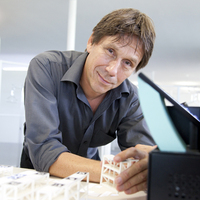 A former teacher in elementary school, Pierre Dillenbourg graduated in educational science (University of Mons, Belgium). He started his research on learning technologies in 1984. In 1986, he applied machine learning for developing a self-improving teaching system. He obtained a PhD in computer science from the University of Lancaster (UK), in the domain of artificial intelligence applications for education. He has been senior scientist at the University of Geneva. He joined EPFL in 2002. He has been the director of Center for Research and Support on Learning and its Technologies, then academic director of Center for Digital Education, which implements the MOOC strategy of EPFL. He is full professor in learning technologies in the School of Computer & Communication Sciences, where he leads the CHILI Lab: “Computer-Human Interaction for Learning & Instruction ». He has been the director of the leading house DUAL-T, which develops technologies for dual vocational education systems (carpenters, florists,…). With EPFL colleagues, he launched in 2017 the Swiss EdTech Collider, an incubator with more than 90 start-ups in learning technologies. He (co-)-founded 5 start-ups, does consulting missions in the corporate world and joined the board of several companies or institutions. In 2018, he co-founded LEARN, the EPFL Center of Learning Sciences that brings together the local initiatives in educational innovation. He is a fellow of the International Society for Learning Sciences. He currently is the Associate Vice-President for Education at EPFL.
A former teacher in elementary school, Pierre Dillenbourg graduated in educational science (University of Mons, Belgium). He started his research on learning technologies in 1984. In 1986, he applied machine learning for developing a self-improving teaching system. He obtained a PhD in computer science from the University of Lancaster (UK), in the domain of artificial intelligence applications for education. He has been senior scientist at the University of Geneva. He joined EPFL in 2002. He has been the director of Center for Research and Support on Learning and its Technologies, then academic director of Center for Digital Education, which implements the MOOC strategy of EPFL. He is full professor in learning technologies in the School of Computer & Communication Sciences, where he leads the CHILI Lab: “Computer-Human Interaction for Learning & Instruction ». He has been the director of the leading house DUAL-T, which develops technologies for dual vocational education systems (carpenters, florists,…). With EPFL colleagues, he launched in 2017 the Swiss EdTech Collider, an incubator with more than 90 start-ups in learning technologies. He (co-)-founded 5 start-ups, does consulting missions in the corporate world and joined the board of several companies or institutions. In 2018, he co-founded LEARN, the EPFL Center of Learning Sciences that brings together the local initiatives in educational innovation. He is a fellow of the International Society for Learning Sciences. He currently is the Associate Vice-President for Education at EPFL.
Denis Alamargot
Institut National Supérieur du Professorat et de l’Éducation de l’académie de Poitiers, Université de Poitiers, France
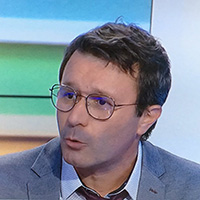 Denis Alamargot is currently director of the INSPE of the Academy of Poitiers and president of the scientific council of the EAFC of the Academy of Poitiers. He is University Professor in Cognitive Psychology at the INSPE of the Academy of Poitiers, University of Poitiers, member and deputy director of the CHArt laboratory (EA 4004), responsible for the “Cognitive Sciences for Education” axis (UPEC) as well as an associate member of the UMR CeRCA-CNRS (University of Poitiers). He conducts research on the development and functioning of written production in children, students and professional writers, by analyzing eye and graphomotor movements. He has published various reviews, including the reference book “Through the models of writing” and experimental articles on writing, spelling and graphomotor processes. He is co-inventor of the “Eye and Pen ©” software and has registered 3 software patents in this context (APP).
Denis Alamargot is currently director of the INSPE of the Academy of Poitiers and president of the scientific council of the EAFC of the Academy of Poitiers. He is University Professor in Cognitive Psychology at the INSPE of the Academy of Poitiers, University of Poitiers, member and deputy director of the CHArt laboratory (EA 4004), responsible for the “Cognitive Sciences for Education” axis (UPEC) as well as an associate member of the UMR CeRCA-CNRS (University of Poitiers). He conducts research on the development and functioning of written production in children, students and professional writers, by analyzing eye and graphomotor movements. He has published various reviews, including the reference book “Through the models of writing” and experimental articles on writing, spelling and graphomotor processes. He is co-inventor of the “Eye and Pen ©” software and has registered 3 software patents in this context (APP).
Bertrand Schneider
Harvard Graduate School of Education, Harvard University, Cambridge, US
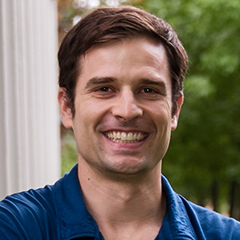 Bertrand Schneider graduated from the Learning Sciences and Technology Design program at Stanford University and was most recently a postdoctoral researcher at the Transformative Learning Technologies Laboratory. His interests include the development of educational interfaces (e.g., augmented reality, tangible, multitouch) for collaborative learning in formal and informal learning environments (e.g., maker spaces). Additionally, he researches the use of multi-modal data (e.g., gaze, body movement, speech, arousal) to visualize and assess students’ learning trajectories.
Bertrand Schneider graduated from the Learning Sciences and Technology Design program at Stanford University and was most recently a postdoctoral researcher at the Transformative Learning Technologies Laboratory. His interests include the development of educational interfaces (e.g., augmented reality, tangible, multitouch) for collaborative learning in formal and informal learning environments (e.g., maker spaces). Additionally, he researches the use of multi-modal data (e.g., gaze, body movement, speech, arousal) to visualize and assess students’ learning trajectories.
David Cohen
Service de Psychiatrie de l’Enfant et de l’Adolescent Hôpital de la Pitié-Salpêtrière, Sorbonne Université, France
 David Cohen is Professor at Sorbonne University (former UPMC) and head of the department of Child and Adolescent Psychiatry at La Salpêtrière hospital in Paris. He is also member of the lab Institut des Systèmes Intelligents et de Robotiques – ISIR (CNRS UMR 7222). His group runs research programs in the field of autism spectrum disorder and learning disabilities, childhood onset schizophrenia, catatonia and severe mood disorder. He supports a developmental and plastic view of child psychopathology, at the level of both understanding and treatment. His team proposes a multidisciplinary approach and therefore collaborates with molecular biologist, methodologist, experimental psychologist, sociologist and engineer. As a member of ISIR, he is collaborating with several engineers within the team Perception, Interaction and Social Robotics. He was President of the IACAPAP 2012 congress. Besides his work as child psychiatrist, he also has artistic activities ( http://www.dcohen.biz/ ).
David Cohen is Professor at Sorbonne University (former UPMC) and head of the department of Child and Adolescent Psychiatry at La Salpêtrière hospital in Paris. He is also member of the lab Institut des Systèmes Intelligents et de Robotiques – ISIR (CNRS UMR 7222). His group runs research programs in the field of autism spectrum disorder and learning disabilities, childhood onset schizophrenia, catatonia and severe mood disorder. He supports a developmental and plastic view of child psychopathology, at the level of both understanding and treatment. His team proposes a multidisciplinary approach and therefore collaborates with molecular biologist, methodologist, experimental psychologist, sociologist and engineer. As a member of ISIR, he is collaborating with several engineers within the team Perception, Interaction and Social Robotics. He was President of the IACAPAP 2012 congress. Besides his work as child psychiatrist, he also has artistic activities ( http://www.dcohen.biz/ ).
Demos
iReCheck – https://irecheck.github.io/
Jianling Zou and Cheyang Wang
Development of innovative approaches for children with writing difficulties. In this project, we propose to combine new technologies to support the child in the context of their school integration with a robot and a serious game that stimulates handwriting.
LearnEnjoy – https://learnenjoy.com/
Noé Keren
Since its creation in 2012, LearnEnjoy has defined itself as a citizen initiative. Today, as a social enterprise, it brings together employees, volunteers, partners, and occasional contributors (authors, trainers, etc.) around an idea: conceiving and creating tools for a modern and caring school. Digital technology and artificial intelligence are harnessed to assist individuals’ decision-making, serving as a lever for the inclusion of students in need, for limited but motivating periods, by combining them with more traditional learning materials.
Emoface – http://emoface.fr/
Adela Barbulescu
Emoface is a spin-off of the Université Grenoble-Alpes, developed within the Gipsa-Lab laboratory, a multidisciplinary research unit jointly affiliated with CNRS, Grenoble-INP, and UGA, and in collaboration with Inria. It has benefited from five years of prior academic research in the field of 3D emotional animation generation. Emoface is the result of long-term scientific research and benefits from the support and feedback of a dedicated community. Since the inception of the project, the team has been working closely with carefully selected partners from the academic, scientific, educational, and medical fields.
Smarteo – https://www.smarteo.co/
Abdelmoughith Feki
Primarily dedicated to promoting access to technological education since 2018, SMARTEO comes up thanks to a positive and highly creative team united by a common passion for digital tools and emerging technologies. Every day, we share our knowledge, experiences, and enthusiasm to collaboratively create the best educational games, aiming to transform the learning of digital skills into amazing experiences.
Develop Players – https://www.develop-players.com/
Mariagrazia Benassi
Develop Players is the first cognitive enhancement video game platform for kids with SLD and ADHD. All applied games proposed by Develop-Players are founded on three characterizing elements: a scientific model based on years of research, the personalization of the intervention thanks to the detailed analysis of the cognitive profile of each user, and the possibility of the use of the game independently. In fact, the use of advanced machine learning algorithms allows our games to adapt the difficulty of the game level to the user’s abilities, thus enabling a gradual and effective growth path that would otherwise be impossible. All Develop-Players video games are based on validated scientific research and must pass numerous tests in order to ensure maximum effectiveness and reliability.
Leka – https://leka.io/
Ladislas de Toldi
Leka is a playful educational companion for children with disabilities. Leka has been designed to capture the attention of and interact with children with neurodevelopmental disorders (Autism Spectrum Disorder, multiple disabilities, Down Syndrome). Both reassuring and stimulating, it naturally awakens children’s curiosity and encourages smooth interactions. It acts as a mediator between the adult and the child, while encouraging the latter to remain engaged in an activity.
Important Dates
- Workshop submission deadline,
July 23rd, 2023July 26th, 2023 (EXTENDED) - Workshop acceptance notification, August 1st, 2023
- Workshop camera ready (hard deadline), August 14th, 2023
- Workshop day, October 13th, 2023
Venue and Program
ICMI 2023 will take place at Sorbonne University, Campus Pierre et Marie Curie, located at the center of Paris: 4, Place Jussieu, 75005, Paris.
The campus is accessible by public transports:
- By metro: lines 7 and 10, Jussieu stop;
- By buses: lines 63, 89, 67, 86, 87.
Please, check the RATP website for further information:
https://www.ratp.fr/
The workshop will be held on Friday 13th October at Room 106, accessible from Rotonde 44.
The meeting room will be accessible from 8:30.
We kindly ask speakers to manifest their presence to the organization and test their presentation or their pc during the pauses.
Demos presenters and posters holders are asked to prepare a short (1min) introduction trailer to be presented at 12:20.
Demos and posters should be ready before the afternoon break at 14:50.
Submissions
The workshop welcomes the submission of short papers (max 4 pages) matching the ACM Conference Template through the EasyChair submission system. All contributions will be subject to blind peer review by a minimum of two independent experts in the field. The Program Committee made of academic experts in social interfaces, education, and children with special needs will ensure the acceptance of high-quality contributions. Accepted papers will be published on the conference proceedings.
We kindly ask the authors to strictly follow the guidelines of the conference for the submissions.
Topics of interest will include, but will not be limited to:
- Theoretical and practical approaches to education with multimodal, interactive interfaces
- Socially intelligent agents for education;
- Multimodal, assistive interfaces for learning disabilities;
- Educational interfaces for students with special needs;
- Serious games and gamification;
- Tailored education and personalization;
- Teachers perception and trust on multimodal, interactive interfaces
- Collaborative design for education;
- Attention and engagement metrics;
- Long-term interaction;
- Affective interaction and emotional understanding;
- Socio-cognitive skills training;
- Verbal, non-verbal communication and backchannels;
- Context aware social interaction;
- Social interaction in joint activities;
- Timing, synchrony and coordination;
- Multi-party interaction in educational environments;
- Multimodal perception for human intent estimation in the wild.
Organising Committee
- Daniel C. Tozadore, École Polytechnique Fédérale de Lausanne, Switzerland
- Lise Aubin, Hôpital de la Pitié-Salpêtrière, AP-HP, France
- Soizic Gauthier, Forward College, France
- Barbara Bruno, Karlsruher Institut für Technologie, Germany
- Salvatore M. Anzalone, Université Paris 8, France
Contacts
- Email: icmi2023miie (at) easychair.org
- Website: https://irecheck.github.io/icmi2023/






